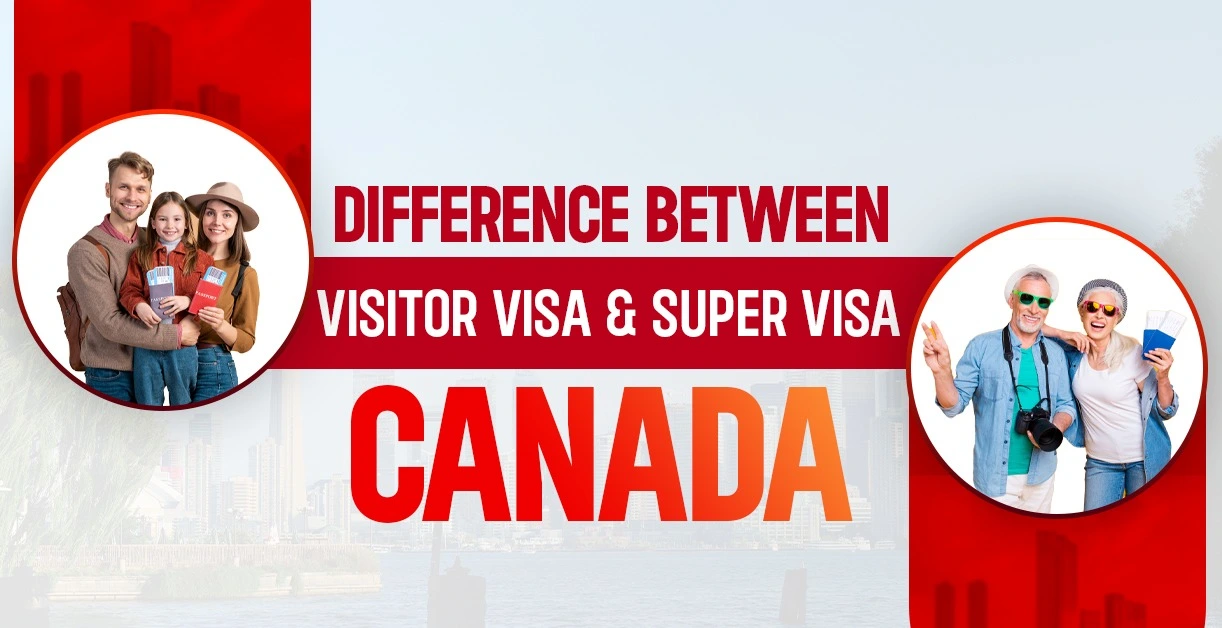Difference Between Super Visa vs Visitor Visa
The Canadian Super Visa is categorized as a visiting visa, although it is only intended for parents and grandparents of Canadian citizens and permanent residents.
The primary difference between the two visas is the length of the allowable stay in Canada. A visiting visa provides for a maximum stay of six months. A Super Visa allows qualified parents and grandparents to stay in Canada and visit relatives for up to five years.
What is the visitor’s visa?
Most tourists require a visiting visa to enter Canada. You may also require one if you are travelling via a Canadian airport on your way to your final destination.
A visiting visa (sometimes known as a temporary resident visa) is an official document that the Canadian government will place in your passport to confirm that you satisfy the conditions for travel to Canada.
Most tourists to Canada can stay for up to six months. At the point of entry, the border services officer may grant you permission to stay for less than or more than six months. If this is the case, the date you must leave will be noted in your passport. They can also offer you a visitor record, which shows the date you must leave by.
If you do not receive a stamp in your passport, you may stay for 6 months from the day you entered Canada or until your passport expires, whichever occurs first.
You could require a visiting visa or an Electronic Travel Authorization (ETA). The application paperwork you require depends on:
- The type of travel document you plan to travel with
- The country that issued your travel document
- Your nationality
- Your method of travel to Canada for this trip
What is a Super Visa?
The Super Visa permits parents and grandparents of Canadian citizens and permanent residents to visit their family for up to five years without having to renew their visitor status. Super Visa holders are allowed to enter Canada several times for up to ten years.
The Super Visa is a better option than the Parents and Grandparents Program (PGP) since it does not need a lottery, providing families with more confidence when sponsoring their family members.
What are the Super Visa’s eligibility requirements?
To qualify for the Super Visa, an applicant must be the parent or grandparent of a Canadian citizen or permanent resident. An application may include the applicant’s spouse or common-law partner, but no dependents.
Furthermore, the applicant must not be ineligible to Canada because of crime or health. Super Visa candidates must undergo a medical check to establish this.
An applicant’s purpose for visiting Canada will be assessed; the applicant must be able to retain adequate links to their native country.
Immigration, Refugees and Citizenship Canada (IRCC) guarantees that parents and grandparents receive enough support throughout their stay in Canada. To demonstrate this assistance, the applicant’s kid or grandchild must be able to show that they fulfill the income limitations established by the Low-Income Cut Off (LICO).
The income criterion is designed to guarantee that the kid or grandchild can financially assist their family members, as caring for an aging family member can be a burden.
The documentation that follows can be used to demonstrate financial ability:
- Notice of Assessment (NOA) or T4/T1 for the most recent tax year
- Employment Insurance Stubs
- An employment letter that includes salary and hire date
- Pay stubs
- Bank statements
The applicant must also present a signed letter from their kid or grandchild welcoming them to Canada, which includes:
- A promise of financial support for the length of your visit
- The list and number of people in the household of this person
- A copy of this person’s Canadian citizenship or permanent resident document
- The applicant must also have medical insurance from a Canadian insurance company that is:
- Valid for at least 1 year from the date of entry
- At least $100,000 of emergency coverage
- Have proof that the medical insurance has been paid in full
Once the applicant has determined that they are qualified and have all of the necessary papers, the application should be processed by the Canadian visa office responsible for the applicant’s place of residency outside of Canada.



